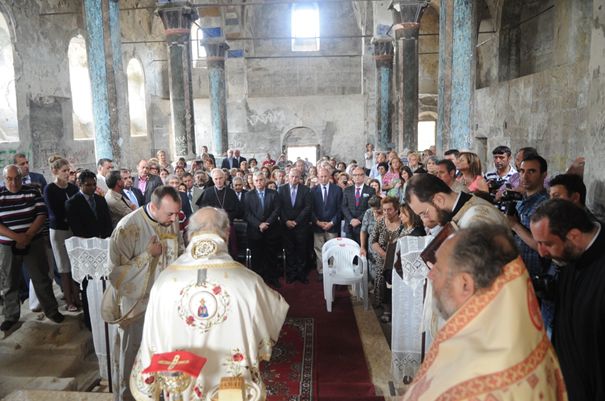On 21 and 22 June 2014, Archbishop Vercammen accompanied the Ecumenical Patriarch Bartholomew on his annual pilgrimage to Cappadocia. The personal invitation reflects the high esteem attached to the Orthodox relations with the churches of the Union of Utrecht. The Patriarch’s annual pilgrimage highlights the importance of Cappadocia as the cradle of Christianity. This year he was joined by several hundred Greek Christians, some of whom are descendants of the exiled Christians who were part of a living church in the region until the beginning of the 20th century. Today many church buildings and monasteries stand empty. Some have become tourist attractions; others are neglected. Archbishop Vercammen described his impressions upon his return.
Church buildings are beings. But their worshippers had to leave, and now they stand neglected. One of the consequences of the Greco-Turkish War of 1921–22 was that a million Greek-speaking Christians were deported from Cappadocia to Macedonia and elsewhere, forced to leave all their belongings behind. Several hundred thousand Muslims living in Greece met the same fate. The 1923 Treaty of Lausanne shaped the ideal of a nation state: one nation, one people, one culture, one religion. Rulers love simplicity. The suffering caused can still be felt today. Descendants of the deported Christians travel by bus to Cappadocia to pray with the Patriarch and celebrate the Eucharist. A few hundred people have come. For the last 15 years the Patriarch has received permission from the Turkish government to lead an annual pilgrimage here. The economic benefits surely play a role; the pilgrims give a boost to the local tourist economy.
 Being a Christian in Cappadocia is by no means self-evident. A few years ago, permission was denied to two Roman Catholic monks who wanted to open a small retreat centre with a church. Today they practise their religion in an ordinary house in a village. Extending the hand of friendship is what drives them. Becoming a Christian here means shutting oneself off from society. It’s a very serious decision. Some years ago the Roman Catholic bishop of Cappadocia was murdered by his chauffeur, who claimed afterwards that he had killed the son of Satan. Religious violence is still rife in Turkey, driven by a heady atmosphere of conflicting religious views in which people try to find their own spiritual homes. Patriarch Bartholomew speaks out in favour of religious tolerance and a multi-cultural society. The uniformity of the nation state is oppressive and violent. Those who strive for peace must give people space to find their religion. The Patriarch is a vocal supporter of solidarity between Muslims and Christians. His firm conviction is that those who truly believe are allies in building a peaceful society that offers real security.
Being a Christian in Cappadocia is by no means self-evident. A few years ago, permission was denied to two Roman Catholic monks who wanted to open a small retreat centre with a church. Today they practise their religion in an ordinary house in a village. Extending the hand of friendship is what drives them. Becoming a Christian here means shutting oneself off from society. It’s a very serious decision. Some years ago the Roman Catholic bishop of Cappadocia was murdered by his chauffeur, who claimed afterwards that he had killed the son of Satan. Religious violence is still rife in Turkey, driven by a heady atmosphere of conflicting religious views in which people try to find their own spiritual homes. Patriarch Bartholomew speaks out in favour of religious tolerance and a multi-cultural society. The uniformity of the nation state is oppressive and violent. Those who strive for peace must give people space to find their religion. The Patriarch is a vocal supporter of solidarity between Muslims and Christians. His firm conviction is that those who truly believe are allies in building a peaceful society that offers real security.
On the pilgrimage in Cappadocia, we take a small step together on that journey. It is a privilege to be part of it. It reminds me of the monk who lives alone in a large monastery after all the other monks have left. He rings the bell every morning and every evening. He prays alone and holds fast to his calling from the Lord. He hopes and believes that another monk will join him one day, but he can’t say for sure whether that will ever happen. As the Patriarch poignantly puts it, “Nostalgia keeps us going and the future is uncertain.” But every year for the last 15 years he has come back to ring the bell.
Cappadocia is the cradle of Christianity. We call on its witness in our efforts to build peace. It is a land of deep faith but also great suffering. The Patriarch is sowing the seeds of tolerance and friendship: mustard seeds for the Kingdom of Heaven. He is like a stepfather who takes pity on the deserted churches. “Every year I go to those churches at Eastertide to proclaim the resurrection,” he says. And every year the prayers of the faithful fill them with new hope.
Archbishop Joris Vercammen

